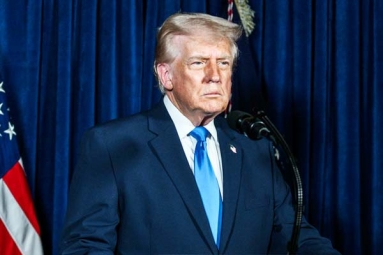
(Image source from: x.com/WhiteHouse)
A coalition of Democratic-leaning states and civil rights groups is suing President Donald Trump over his plan to strip the United States of its birthright. Within hours of Trump's inauguration, several separate lawsuits were filed and he quickly announced a series of executive orders intended to reform the U.S. immigration system. The first two lawsuits, filed by the American Civil Liberties Union, immigrant groups and pregnant women, came hours after President Trump signed the executive order, sparking the administration's first major legal battle. Two other lawsuits were filed in federal courts in Boston and Seattle by 22 Democratic-led states, the District of Columbia and the city of San Francisco. The lawsuits alleged that the president exceeded his authority and violated the U.S. Constitution by attempting to eliminate automatic citizenship for people born on U.S. soil. Massachusetts Attorney General Andre Joy Campbell's office announced that more than 150,000 children born in the United States would be denied their citizenship rights for the first time if President Trump's order is approved. In a statement, he said: “President Trump does not have the authority to take away his legal rights.”
Anyone born in the United States is considered a citizen at birth. It traces its roots to the Citizenship Clause of the Fourteenth Amendment, which was added to the United States Constitution in 1868. The amendment states: "Every person born or naturalized in the United States is a citizen of the United States and of the state in which he resides and is subject to the jurisdiction of the United States." The Immigration and Nationality Act of 1952 also defines citizenship and contains similar wording. The 14th Amendment to the United States Constitution was ratified in 1868 after four years of civil war to overturn the Supreme Court's Dred Scott v. Sandford decision, which denied African Americans constitutional rights. Previous rulings held that enslaved people were not U.S. citizens and could not expect protection from the federal government or the courts. In 1898, the U.S. Supreme Court affirmed in Wong Kim Ark v. United States that birthright citizenship applies to children of immigrants. Wong, who was born in the United States to Chinese immigrants, was denied re-entry after returning to the United States from China. Mr. Wang successfully argued that his parents' immigration status, based on his birth in the United States, had no bearing on the application of the Fourteenth Amendment to the Constitution to him.
The case confirms that all children born in the United States, regardless of the race or immigration status of their parents, are entitled to all the rights afforded by citizenship. However, the Supreme Court has addressed the question of whether the Citizenship Clause applies to U.S.-born children of people who are in the U.S. illegally. President Donald Trump's executive order states that people born in the United States do not automatically have the right to citizenship if their mother is in the country illegally and their father is not a citizen or lawful permanent resident. It was also announced that individuals whose mothers are in the United States legally but temporarily, such as on student or tourist visas, and whose fathers are not citizens or lawful permanent residents of the United States will not be granted citizenship.
President Trump expressed displeasure with foreign women traveling to the United States to give birth or gain American citizenship. The U.S. Department of Homeland Security estimates that there were 11 million illegal immigrants in the U.S. as of January 2022, and some analysts now estimate the number at 13 to 14 million whose U.S.-born children are being naturalized by the government of the United States. The states have said in the lawsuit that losing citizenship means losing access to federal programs like Medicaid and being unable to legally work or vote as they age. Legal experts say birthright citizenship cannot be revoked through an ordinance as this would inevitably lead to litigation.
Saikrishna Prakash, a constitutional expert and professor at the University of Virginia School of Law, said: "He does things that upset a lot of people, but ultimately the court will decide... it's not his fault. "That can't be decided arbitrarily." According to BBC Prakash pointed out that President Trump could order federal officials to interpret citizenship more strictly, but that would lead to legal challenges from those denied citizenship, he said aloud BBC. This could lead to a long legal battle that could end up in the US Supreme Court. A constitutional amendment can revoke citizenship rights, but it requires a two-thirds majority in both houses of Congress and the approval of three-quarters of the U.S. states. Republicans have a 47-53 majority in the Senate and a 215-220 majority in the House, meaning America's grand old party (the Republican Party) lacks the numbers in both chambers.
Three of the four lawsuits challenging President Trump's order were filed in Massachusetts and New Hampshire. The New England judges' rulings will be reviewed by the Boston-based U.S. Court of Appeals, which is made up of all active judges, Reuters reported. Four states have filed a separate lawsuit in Washington, which is being overseen by the 9th Circuit Court of Appeals in San Francisco. U.S. District Judge John Kagner in Seattle has scheduled a hearing for Thursday on whether to issue a preliminary injunction to block Trump's orders. A fifth lawsuit was filed in federal court in Maryland by a group of pregnant women and immigrant rights groups, including CASA.
Various lawsuits allege that President Trump's executive orders violate the rights contained in the Citizenship Clause of the Fourteenth Amendment, which states that anyone born in the United States does so. The lawsuit cites the U.S. Supreme Court's 1898 decision in U.S. v. Wong Kim Ark, which held that U.S.-born children of noncitizen parents are entitled to U.S. have citizenship. The plaintiffs challenging the ruling include a Massachusetts resident who goes by only his first name, “O. Doe” is identified as being on temporary protection in the country and has been living in the country for three years. Temporary protection status is available to people who have experienced a natural disaster, armed conflict or other exceptional situation in their home country and is currently available to more than 1 million people in 17 countries. Several other lawsuits challenging other aspects of Trump's initial executive actions are also pending.
The Treasury Department Employees Union, which represents federal employees in 37 agencies and departments, protested late Monday against an executive order signed by President Trump that would make it easier to fire thousands of federal workers and replace them with political allies.



















